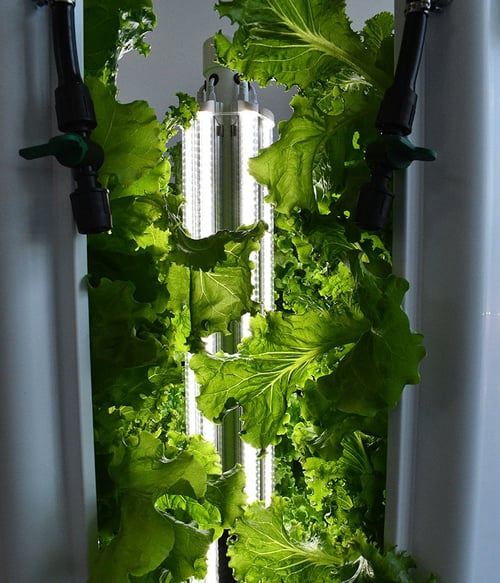Can You Grow Food Year-Round With an Indoor Hydroponic Garden?
Hydroponics is a groundbreaking method of cultivating plants without the use of soil. This innovative technique has transformed the way fresh, nutritious food is grown. By enabling plants to thrive year-round in a controlled indoor environment, hydroponic systems appeal to gardeners worldwide, regardless of their level of experience.
Hydroponics Advantages
Objectively speaking, hydroponic gardens offer several advantages over soil-based gardening. Because of their streamlined nutrient delivery, hydroponic crops receive the ideal amount of vitamins and minerals. This typically results in faster growth rates and higher yields compared to traditional cultivation; nutrient content is usually on par or higher for hydroponically grown foods as well.
Instead of using soil, plants grown in these systems get the nutrients they need through water-based solutions and a support structure typically made of materials like vermiculite, coconut coir, perlite, or clay pellets. This soil-less environment also minimizes the risks of pests and diseases, thereby eliminating the need for harmful pesticides or herbicides. Plus, the absence of soil removes the threat of soil-borne pathogens and reduces the chances of heavy metal contamination. All of this contributes to cleaner, safer produce.
Yet another advantage of hydroponic gardening systems is their overall efficiency. They use far less water–some 90%–than traditional soil-grown crops. The water they do consume is recirculated and reused, further reducing waste. They also take up far less space than traditional farms, as vertical stacking systems allow you to maximize crop yields in a limited area while using fewer natural resources. When plants are grown on-site–or closer to home–food travel miles are curtailed or eliminated.
That said, one of the biggest advantages of hydroponic farming is the ability to grow year-round. Indoor systems are in no way dependent on the seasons, weather conditions, or any other factors that may inhibit or restrict growth to a given time of year. Utilizing a controlled environment, as touched on earlier, as well as proper setup, regular maintenance, and smart crop selection, allows growers to enjoy a steady supply of fresh greens anytime.
For A Never-Ending Harvest Look To An Indoor Garden
Indoor farming offers an excellent solution to the challenges posed by seasonality in traditional agriculture. By establishing a closely controlled environment, which includes monitoring temperature, humidity, lighting, and delivery of nutrients, among other factors, growers can optimize their system for continuous crop production.
The right setup will undoubtedly contribute to a successful year-round harvest. Some of the best systems on the market use a compact vertical layout, where plants are stacked to maximize space and reduce the operation’s overall footprint. One example is the Flex Farm, which leverages space-saving technology while only requiring a standard electrical outlet and less than 10 square feet of space; it’s also portable, allowing growers to maneuver the unit into any desired location, whether that’s a balcony or the corner of a classroom or cafeteria.
While a wide variety of plants can thrive in water-based systems, some fruits, vegetables, and herbs generally grow faster and produce larger yields than others. Lettuce and similar leafy greens are typically the best performers; for example, you can expect to produce a harvestable supply of romaine, buttercrunch, iceberg, bibb, or whatever type of lettuce you prefer in about 30 days.
Spinach, collard greens, Swiss chard, and bok choy also flourish in hydroponic gardens, though they tend to take a bit longer to reach maturity and may require a little extra temperature and pH adjustment. Other traditional favorites include strawberries, peppers, peas, cucumbers, and various herbs–basil, chives, cilantro, dill, oregano, parsley, rosemary, sage, thyme, etc.
What’s truly unique about hydroponics is that you can cultivate this wide range of crops from anywhere, at any time of year. It doesn't matter if plants aren’t native to your climate–these systems allow you to recreate the conditions of their natural environment.
Speaking of climate, the elements are a nonfactor for hydroponic systems as long as growers routinely monitor and maintain their gardens. Forget about the threat of severe weather conditions causing crop failures or otherwise compromising your harvest. Hydroponics is impervious to climate fluctuations and/or seasonal factors–drought, flooding, excessive heat or cold, etc.
Market-leading Hydroponic Garden Solution
Among all the advantages of hydroponic systems, their ability to sustain a continuous growing cycle–regardless of season–belongs toward the top. There’s just no comparing the efficiency of these gardens with their soil-based counterparts.
In terms of yield, indoor hydroponic gardens provide uninterrupted food production. This means that if the Flex Farm system produces 25-plus lbs. of food per four-week harvest, you’re looking at a remarkable 325 lbs. (or more) of fresh fruits and vegetables each year!
One more thing: For all its practical uses in food production, hydroponics has emerged as a dynamic learning opportunity for the classroom in recent years. Educators are discovering the myriad benefits of integrating this hands-on activity into their curricula. Students are developing practical new skills while contributing to a more sustainable future. From kindergarteners to high schoolers, every age group is benefiting from today’s highly adaptable, scalable solutions throughout the school year.
So, if the issue on the table is whether you can grow food year-round with an indoor hydroponic garden, the answer–whether you’re a seasoned farmer or just getting started–is a resounding yes. The only questions that remain are what you want to grow and when you’re ready to get started!
Contact one of our expert team members today for more information on ANY questions you have about hydroponic growing, including the best system for your individual goals or program.
Subscribe to our blogs
Is the Flex Farm right for you?
Connect with an expert member of our team and let’s work together to bring your growing experience to life. To help get you connected with the best person, please tell us where you are located.



